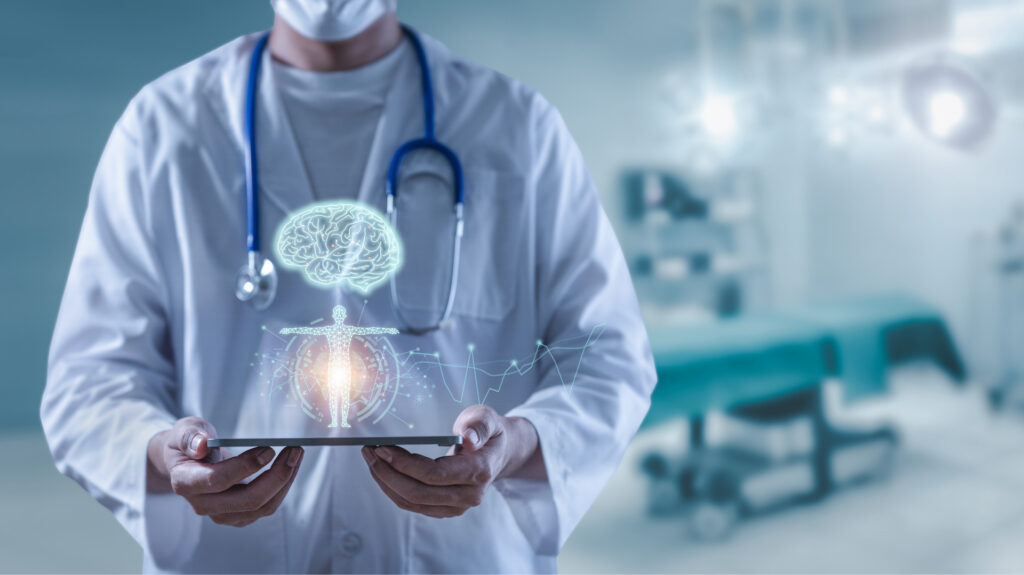

I spoke about AI’s potential to significantly enhance healthcare and advance science last week at the Lake Nona Impact Forum for global health advancement. Our recent advancements in artificial intelligence present unheard-of opportunities to significantly accelerate scientific discovery and make healthcare more readily available, individualized, and efficient for everyone. Here is an update on our progress, our recently announced AI co-scientist, and how we are bringing AI into global healthcare settings with partners.
Accurate health data are becoming more easily accessible thanks to AI. We strive to ensure that everyone has access to high-quality, relevant health information in times of need because Google is frequently the first place people look for answers to health-related questions. We piloted AI tools on YouTube with health creators and organizations like Cleveland Clinic to make it easier for them to publish authoritative, high-quality content. Using Lens, users can search for skin conditions that are visually similar to what they see on their own skin. We launched MedLM and Search for Healthcare, which can answer medical questions, for healthcare providers. These are available on the Google Cloud Vertex AI platform, making it easier for doctors to make better decisions and for patients to get the care they need exactly. Our study of medical factuality guarantees that language models’ health-related content is as factually accurate and reliable as possible.
Personalized healthcare is on the way thanks to generational AI. We are able to reimagine patient care and the ways in which it could be personalized for everyone, with an emphasis on preventive healthcare, thanks to advancements in multimodality and conversational AI. Medicine is multimodal, using everything from X-rays to digital health records. We developed Med-Gemini, next-generation healthcare models that are fine-tuned on de-identified medical data and are based on our MedLM research, which has superior multimodal and reasoning capabilities. Med-Gemini’s accuracy on U.S. medical exam-style questions was 91.1% in published research, and we demonstrated how the models can effectively interpret 3D scans or respond to complex clinical questions. Using Articulate Medical Intelligence Explorer (AMIE), a research AI system designed specifically for diagnostic reasoning and conversations, we are investigating how AI systems might function as conversational diagnostic partners in clinical settings. It is made to take a “clinical history,” ask thoughtful questions to help figure out a differential diagnosis, and show empathy during discussions, even in subspecialist domains. Using data like heart rate and step count, generative AI models could provide personalized insights for both health and wellness on mobile and wearable devices.
Another refined version of Gemini, the Personal Health Large Language Model, can interpret sensor data to provide insights and recommendations about a person’s fitness and sleep habits. Globally, AI is improving health outcomes. Improved health outcomes depend on early disease diagnosis. We have developed AI models that use AI’s imaging and diagnostic capabilities to assist in the detection of diseases such as diabetic retinopathy, lung cancer, and breast cancer. We are currently scaling these solutions into clinical settings through partnerships so that more patients can benefit from timely and accurate screenings. In countries with fewer specialist doctors per capita and medical settings with limited resources, the impact is particularly significant. Our health-tech partners in India and Thailand want to provide free diabetic retinopathy screenings to 6 million patients over the next ten years. Apollo Radiology International will use our artificial intelligence models to provide free screenings for tuberculosis, lung cancer, and breast cancer to 3 million people in India. An ML model for cardiotocography, which is used to predict fetal well-being and is being developed in addition to our other efforts to improve maternal health in Africa, is being investigated for its potential in medical settings with limited resources. Additionally, we are laying the technological groundwork for increased healthcare accessibility. Open-weight models and resources from our Health AI Developer Foundations assist developers in creating AI models for healthcare in a more effective manner. And solutions powered by our Open Health Stack (OHS) — a suite of open-source tools that makes it easier for developers to create next-gen digital health solutions for healthcare workers — have already been deployed across regions in Africa, South Asia and Southeast Asia to support frontline healthcare workers serving millions of patients.
The advancement of science is being sped up by AI. Science is the foundation of medicine. Through our work on AI co-scientist, a multi-agent AI system based on Gemini 2.0, we are examining how AI could enhance scientific and biomedical discovery by building on AI’s ability to synthesize information and perform complex reasoning tasks. AI co-scientist was created as a tool for scientists to work together. Its purpose is to provide scientists with assistance in developing novel research hypotheses and proposals based on existing evidence and tailored to specific research objectives. It has already demonstrated potential in areas like drug repurposing for acute myeloid leukemia, generating hypotheses for novel treatment targets for liver fibrosis, and describing the horizontal gene transfer mechanisms that underlie antimicrobial resistance. Each of these applications is a complex one that comes with its own unique set of difficulties. We continue to recognize AI’s incredible potential to advance science as well as to enhance, personalize, and democratize healthcare access. The “magic cycle” in which breakthroughs in research are turned into real-world effects is accelerating and getting bigger. In collaboration with global partners, we will responsibly pursue this opportunity and continue to share our research. In 2024, we published more than 50 papers presenting cutting-edge health research, and we recently released our 2025 Health Impact Report. In the end, we believe that AI will continue to contribute to the advancement of science and healthcare for the benefit of billions of people.




